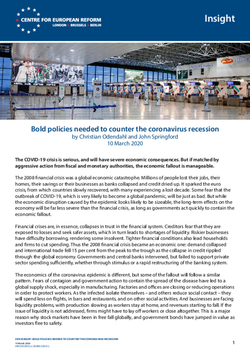
Bold policies needed to counter the coronavirus recession
The COVID-19 crisis is serious, and will have severe economic consequences. But if matched by aggressive action from fiscal and monetary authorities, the economic fallout is manageable.
The 2008 financial crisis was a global economic catastrophe. Millions of people lost their jobs, their homes, their savings or their businesses as banks collapsed and credit dried up. It sparked the euro crisis, from which countries slowly recovered, with many experiencing a lost decade. Some fear that the outbreak of COVID-19, which is very likely to become a global pandemic, will be just as bad. But while the economic disruption caused by the epidemic looks likely to be sizeable, the long-term effects on the economy will be far less severe than the financial crisis, as long as governments act quickly to contain the economic fallout.
Financial crises are, in essence, collapses in trust in the financial system. Creditors fear that they are exposed to losses and seek safer assets, which in turn leads to shortages of liquidity. Riskier businesses have difficulty borrowing, rendering some insolvent. Tighter financial conditions also lead households and firms to cut spending. Thus the 2008 financial crisis became an economic one: demand collapsed and international trade fell 15 per cent from the peak to the trough as the collapse in credit rippled through the global economy. Governments and central banks intervened, but failed to support private sector spending sufficiently, whether through stimulus or a rapid restructuring of the banking system.
The #coronavirus epidemic is serious. Economically, the fallout can be effectively contained. But only if policy-makers in Europe provide aggressive stimulus.
The economics of the coronavirus epidemic is different, but some of the fallout will follow a similar pattern. Fears of contagion and government action to contain the spread of the disease have led to a global supply shock, especially in manufacturing. Factories and offices are closing or reducing operations in order to protect workers. As the infected isolate themselves – and others reduce social contact – they will spend less on flights, in bars and restaurants, and on other social activities. And businesses are facing liquidity problems, with production slowing as workers stay at home, and revenues starting to fall. If the issue of liquidity is not addressed, firms might have to lay off workers or close altogether. This is a major reason why stock markets have been in free fall globally, and government bonds have jumped in value as investors flee to safety.
However, there is a big difference between the uncertainty we faced in the ‘Great Recession’ and the euro crisis, and the situation now. The scale and the severity of the financial crisis was difficult to predict in advance, or while it was unfolding. The coronavirus epidemic is more predictable to epidemiologists, and therefore governments. The virus spreads at a constant rate with new infections doubling every three to four days. That rate can be lowered if containment is effective. Harvard epidemiologist Marc Lipsitch estimates that between 20-60 per cent of the world’s population will get the illness, while the World Health Organisation thinks that, of those who are infected, over 96 per cent will recover (at least in countries with advanced healthcare systems).
This means that the pandemic will spread rapidly, peaking in Europe in May or June, after which the rate of infection will drop and the economy will start to recover. Governments’ attempts to slow the spread of the virus are needed to prevent hospitals from being overwhelmed. But epidemiologists say the infection cannot be stopped altogether. The virus may then become endemic in the population, meaning that there will be seasonal waves of infection, like flu – but these will be far less economically destructive than the initial outbreak. All this suggests that the economic consequences, while severe in the short term, need not be as costly as the financial crisis, so long as governments enact early and aggressive economic policies to support the liquidity of firms, to offset lost wages for workers, and to stimulate the economy more broadly to aid a quick recovery after the epidemic has run its course.
The biggest threat to the economy is viable businesses becoming illiquid and going bust. Temporary disruptions can have permanent effects: a wave of bankruptcies would leave permanent scars on the economy if firms that would have been successful go under, leaving workers unemployed and helpful knowledge redundant, at least for a period.
Confronting this risk will require an alliance of bank regulators, public investment banks, central banks and finance ministers. Bank regulators should encourage banks to be lenient on firms in severely affected sectors of the economy, such as tourism, by rolling over existing loans. But banks will not be able to alleviate businesses’ liquidity problems on their own. Extending loans means that banks are taking on risk. Public investment banks should also provide subsidised credit to the more affected parts of the economy. This is usually done indirectly via private banks, which take on part of the risk of that loan, and who perform diligence on the company’s accounts. That process limits the risk to the public bank’s balance sheet. And as a result, firms that were already on the cusp of bankruptcy, such as the British airline FlyBe, would be unlikely to get publicly subsidised liquidity support.
The European Central Bank (ECB) should add a broad-based credit stimulus to the economy: even well-targeted measures via private banks and public investment banks may not satisfy all of the demand for emergency credit. The best way to do this would be via targeted long-term refinancing operations (TLTROs). Simply put, TLTROs are used to provide cheaper ECB funding to banks the more they expand lending to businesses. The ECB should start a ‘Corona-TLTRO’: very cheap short-term liquidity at negative interest rates, which would encourage banks to extend further credit.
Both firms and workers need help to manage the #Covid19 crisis. Banks, public investment banks, the ECB and finance ministries need to work together to provide a comprehensive package.
Finance ministers should also provide liquidity support through fiscal policy. Firms have to pay wages, even if they have been forced to reduce production for want of labour or supplies. Governments should consider short-work schemes (known as ‘Kurzarbeit’ in Germany, where it has been in place since 1910). Companies can apply for grants if they have to reduce the working week for their staff. Such schemes should be made available for self-employed workers on the same terms. The German government has just announced a simplified and more generous short-work scheme as a result of the COVID-19 related disruptions.
To contain the pandemic, more governments may have to temporarily close educational institutions, such as schools and childcare facilities, as Spain has done in Madrid and hard-hit areas. This threatens parents’ finances if they have to take unpaid leave from work. Nordic countries have pioneered a scheme whereby the government replaces the wages of parents who take time off to care for their children, mostly for the first year after birth. Similar parental pay schemes would help parents – sadly, often mothers – who lose income because they have had to care for children. That the German government failed to include such a policy in its programme announced on International Women’s Day is not without irony.
Further fiscal support can be provided by deferring the collection of VAT and payroll taxes from businesses for three months. Italy has already deferred the payment of payroll taxes. The benefit of that policy is that it provides liquidity very broadly, but it is not without risks: firms on the cusp of bankruptcy will also benefit, leaving the state holding the bag. But many governments in Europe pay negative interest rates on short-term borrowing. So finance ministries would make a profit from accepting delayed tax payments. The net effect to the government balance sheet – a slight loss because of bankruptcies – may well be worth the additional liquidity support in the longer-term. The European Commission should allow member-states to break the eurozone’s fiscal rules this year for COVID-19 related measures.
Once this year’s epidemic is over, there will be some catch-up growth as businesses restock inventories, and consumers make up for forgone spending. This is different from the aftermath of the financial crisis, when debts proved to be unsustainable and had to be worked down, leading to a prolonged period of lower consumption than would otherwise have been the case. But there will be a difference between the shape of the post-epidemic recovery in manufacturing, which will probably experience a sharp rebound, and the services sector, which may struggle for a longer period of time. If consumers planned to buy a new pair of spectacles, but could not buy them when supply was disrupted, they are likely to do so once the epidemic is over. Consumers will not, however, make up for the meals out that they would have eaten while they were isolating themselves. Football matches will be played in empty stadiums and concert tours will skip cities or will be cancelled altogether. ‘Social consumption’ – like meals out, concerts or travel – will be hit hardest, with depressed demand possibly continuing into the summer and autumn as people fear infection even after the epidemic has run its course.
Manufacturing may see a V-shaped recovery from the #coronavirus recession, but services will be a lot harder hit. Pre-announcing temporary VAT cuts when the epidemic is over should help boost confidence now.
Manufacturers may be able to cope with mere liquidity support, as discussed above, because they can reasonably hope for a rapid recovery. But fiscal support will be needed to speed the recovery in services after the worst of the epidemic is over. Governments do not want to encourage people to travel and go to restaurants and other big gatherings, and they should not seek to stimulate social consumption now. But governments could announce that, after the epidemic has officially ended, there will be a six to nine month VAT cut for services sectors that have been hardest hit. That would also encourage banks to extend credit to these businesses, knowing that they will have higher revenues once the epidemic ends.
Stimulus policies should ideally be co-ordinated across Europe, the US and Asia, to signal to firms and markets that the world is determined to minimise the fallout of the epidemic. Some commentators have suggested that fiscal stimulus is pointless, because tax cuts or credit easing will not feed into higher expenditure if people are isolating themselves at home. But not all people will be completely isolated at home for long periods of time – only those who have the virus and who have serious underlying health conditions will have to be isolated for more than two weeks. Online shopping, major purchases like cars, or booking travel for later in the year will be less affected. And administering a fiscal stimulus takes time, and will come online after the peak is reached in most European countries, but, if it is announced immediately, it will improve the economic outlook for businesses and consumers, and ease the panic on financial markets.
Even before COVID-19 reached Europe, its economy was struggling. Now that the outbreak has become an epidemic, a recession in the first half of 2020 is all but certain. This makes early and aggressive action to stimulate the economy – and to manage expectations about future stimulus – imperative. Since the virus is so contagious, the rate of infection is likely to peak within three to four months, before falling back, which means that governments have more certainty than usual about the future path of an economy. If they fail to act, they risk a wave of bankruptcies and rising unemployment. They must be bold.
Christian Odendahl is chief economist and John Springford is deputy director of the Centre for European Reform.


Add new comment